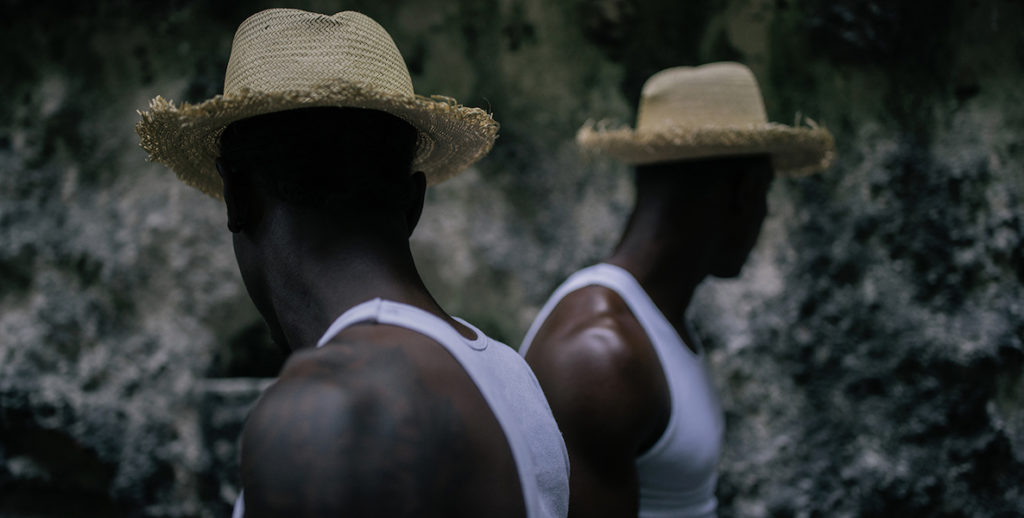Amada Delphine Fawundu may be tackling one of the most challenging roles of our time: parenting three black boys in an era when, despite how far our culture has come, racism and homophobia still plague our society. Deeply.
“I’m raising young black babies into men, wanting them to develop their own identities that will not be tainted by negative stereotypes of black masculinity,” says the Brooklyn-born artist and adjunct professor at Columbia University, whose parents came to the U.S. from Sierra Leone and Equatorial Guinea, West Africa.
A former public school teacher in the South Bronx and Harlem, Fawundu knows the hardships young boys of color face. “I have a 10-year history of teaching only Black and Latino men. So that’s been my life. I’ve been surrounded by this and thinking about teaching Black and Latino men how to navigate a society that already says this is who you are,” she says.
Now she is continuing to use her artistic platform to explore—and challenge—black masculinity: As a photographer, she is the co-creator, with Laylah Amatullah Barryn, of the sold-out book MFON: Women Photographers of the African Diaspora, an independently published collection of photography.
This month, the duo has brought the ethos and aesthetic of their book alive with a groundbreaking photography exhibit, “In Conversation: Visual Meditations on Black Masculinity,” at the African American Museum in Philadelphia (AAMP). The show will run until March 1, 2020.
Since 1976, AAMP has been home to many ground-breaking pieces of art made by black artists. But this exhibit is like nothing before: It solely showcases the artistry of non-binary people and women of color, such as Collette Fournier and Salimah Ali.
“Have you ever been to an exhibition with 55 black women photographers from around the world?” Fawundu posits. No—no one has. “I just wanted the biggest exhibition of black women photographers ever.”
“I think people should come to the exhibition with the open mind to know that women, non-binary photographers are out there doing this work, that we care.“
Walking through the three-floor show, it’s hard not to be completely captivated by the depictions of Black Boy Joy that surround you. Visitors will be enticed by the gross realism of Zephyr Ann Doles’, I Am The Black Gold of the Sun, and the vivid colors behind Eurila Cave’s Masculinity Non-Toxic. The walls are a tapestry of Blackness and self-expression that range from a casual photo of a smoking James Baldwin to a lively still of Earth, Wind & Fire.
But the goal of the show, Fawundu adds, isn’t just artist recognition. Like any profound show of art, it’s about the dialogue the artists hope to start in the community.
“Our work really concerns elevating their voices and creating platforms where we can share the work and have the public and educational institutions engage [with] the work,” she says.
Cultivated by two women of color, this exhibition strives to tear down barriers to get to the heart of what we need to be discussing: race, sexual identity, gender and masculinity. By giving women and non-binary people the voice to lead the conversation, they’re able to delve into the matter unapologetically. And these are matters about which Fawundu believes we must all be educated.
A matter still considered taboo, black masculinity can be a sensitive subject, often left undiscussed, because of the universal assumption that for black men, sexuality, gender, and masculinity are mutually exclusive. This is where the creators disagree with the rest of the broader public.
“People are discussing gender in a very broad sense and discussing what gender can mean to many different people. And I thought it was very important to include that in the visual conversation about masculinity and Black men—especially at this time where we are, for the most part, open to talking about the diversity in gender and sexuality,” says Barrayn.
“I think people should come to the exhibition with the open mind to know that women, non-binary photographers are out there doing this work, that we care,“ says Fawundu.
Through March 1, 2020, $10-14, 701 Arch Street, African American Museum in Philadelphia, 701 Arch Street.
Related

